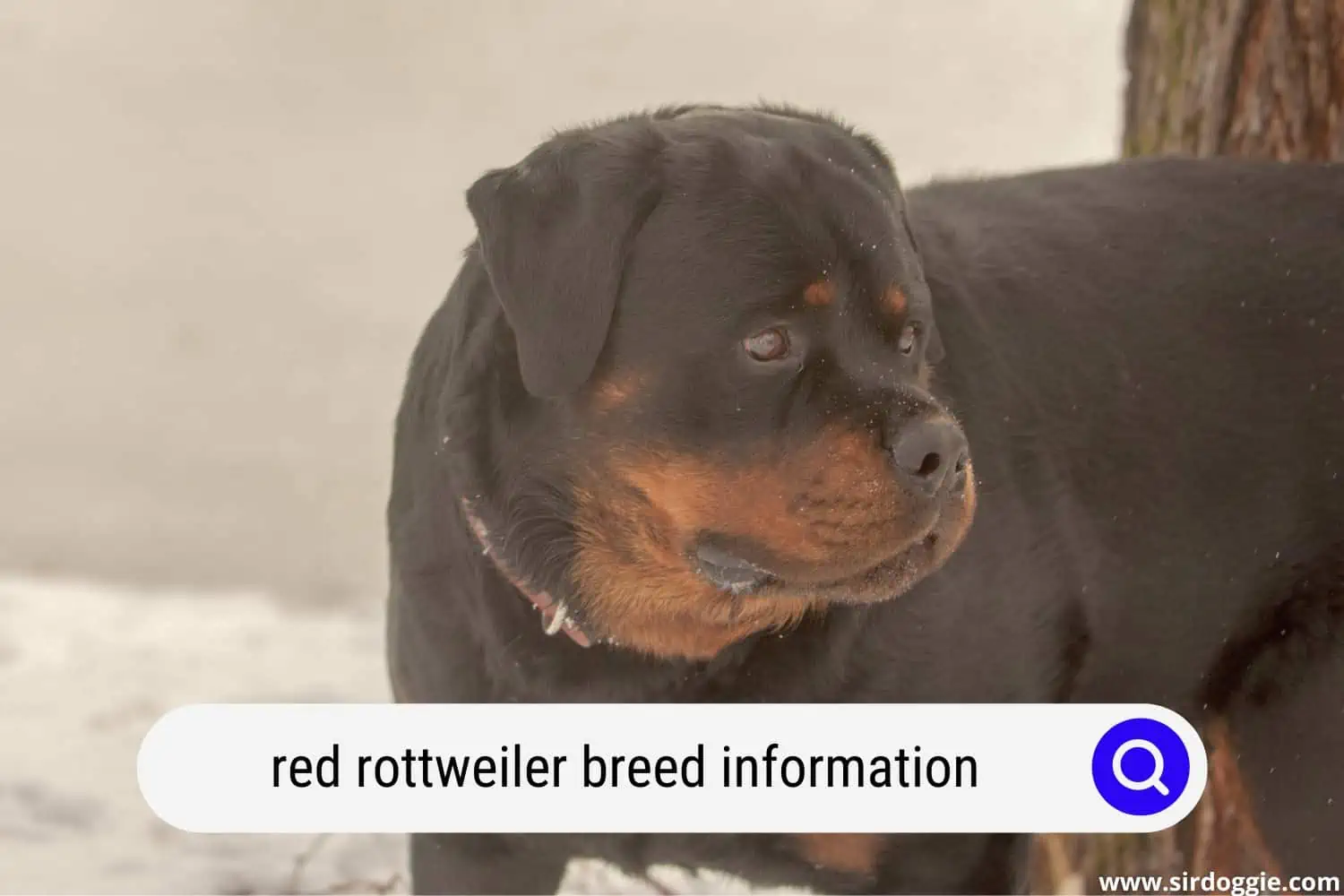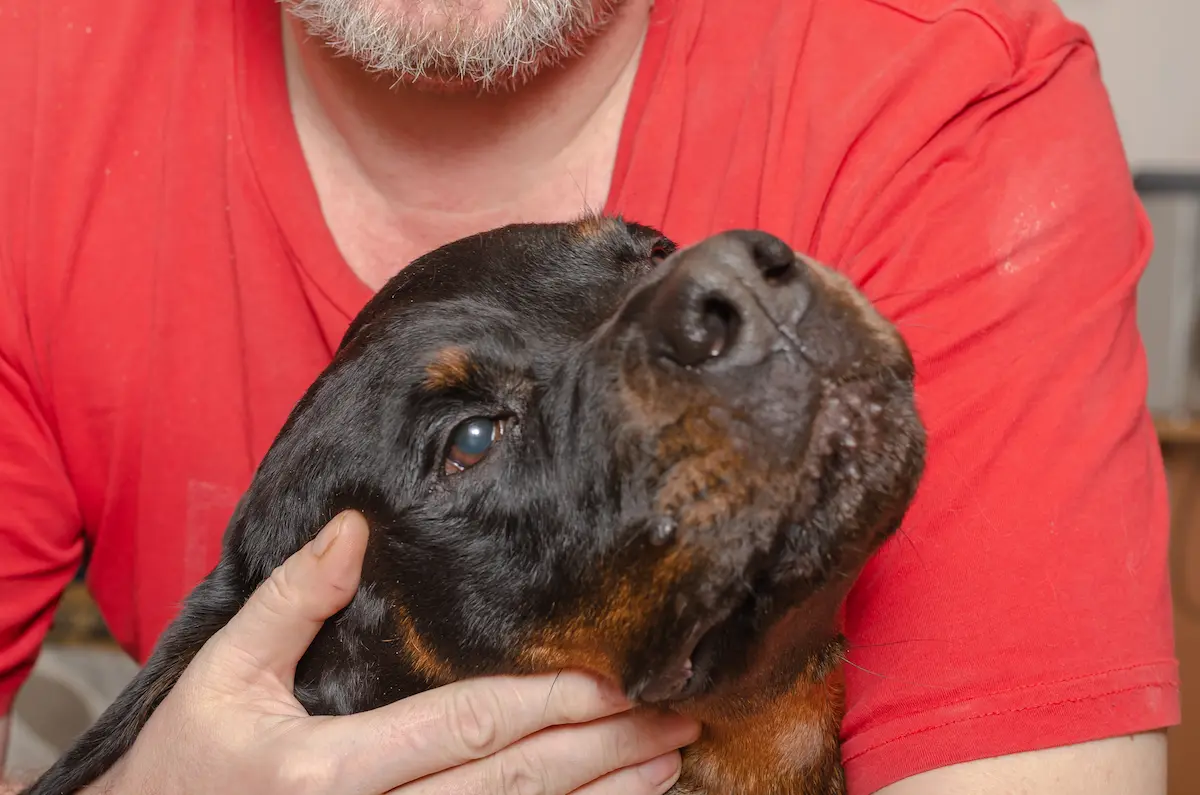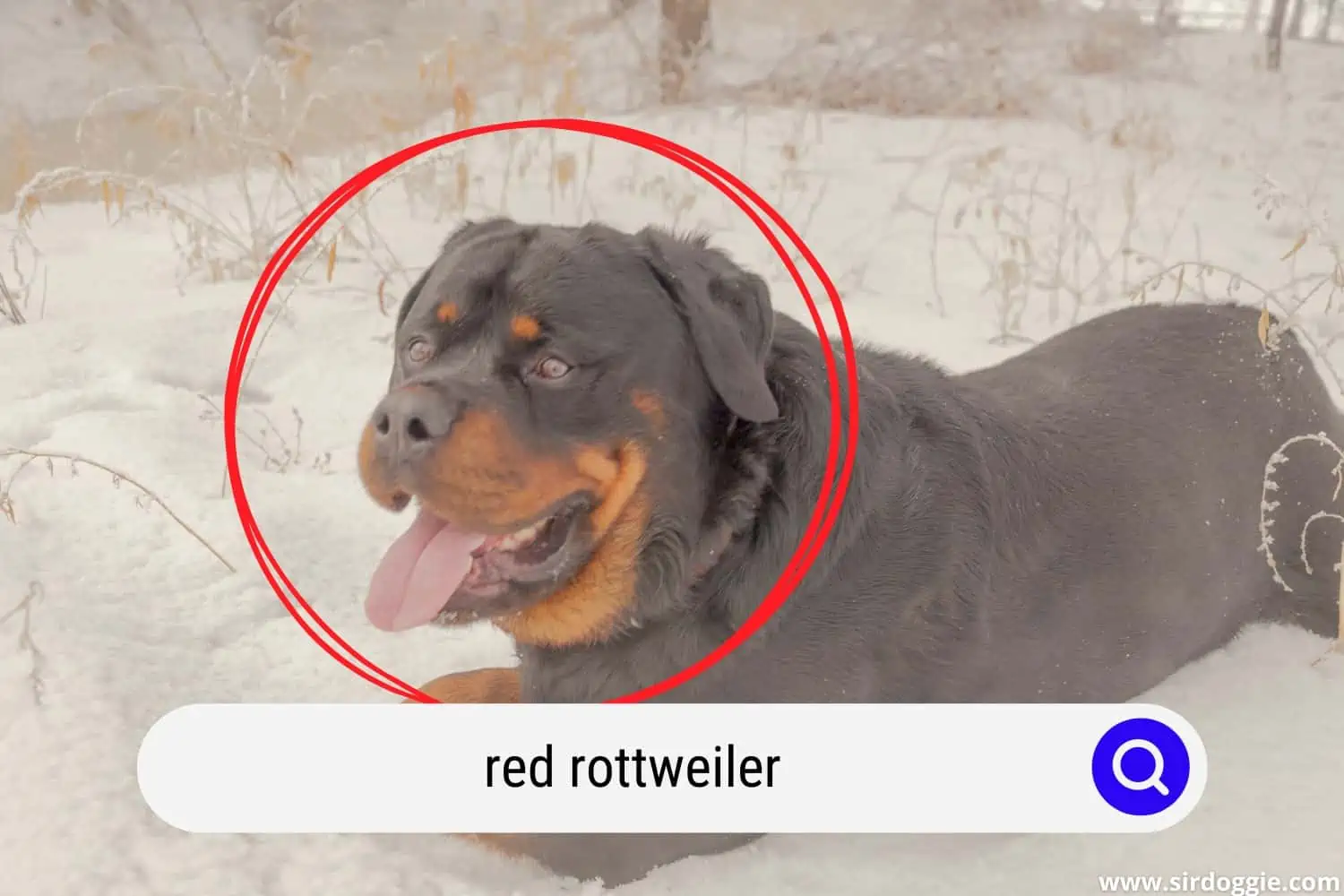The Red Rottweiler, Do They Actually Exist?
Thinking about adding a new furry member to your family and wondering what breed to choose? Are you looking for a rare breed that is energetic, courageous, and playful?

If you answered yes, then you have landed in the right place. A Rottweiler with a red coat sounds exotic and is extremely rare.
This guide explains the breed information, color origin, vital stats, personality, and general health of a Red Rottweiler.
Let’s begin the exciting adventure of getting to know everything about this rare breed.
Some of the links in this post are affiliate, and we may earn a commission.
Related Reading: Check Out Weiler Danes, the Great Dane Rottweiler Mix
Red Rottweiler Breed Information
Dog experts say that rare coloured dogs like Red Rottweilers are the result of cross-breeding. A purebred Red Rottweiler is just like a standard black-and-tan Rott in every other way except the exotic and unique colour.
This dog has a rare reddish coat instead of the traditional black and tan.
Red Rottweiler is a medium-to-large sized dog with a powerful build. The dog has abundant strength and a loving heart. Rotts are considered one of the oldest dog breeds and were originally used to drive cattle and pull carts.
These dogs have high energy and need regular exercise and physical activities to stay happy and healthy.
According to all kennel clubs, red coat in Rottweilers is considered a fault and these dogs can’t compete in dog shows and competitions. Although considered a disqualification, the red coat does not make them undesirable.
These dogs are affectionate, and courageous, and make wonderful companions.

The Red Rottweiler Color Origin
Pure-bred Rotts are known to have strict breeding standards but the earlier breed standards allowed variations in coat color and length. If you notice the ancestors of Rottweiler, you will find a clear difference in coat length and color.
The early acquired colours of Rotties were plain red coats with a white nose. Those dogs had very distinct colour variations and it becomes easy to understand how the genes are still carried in some of the Rottweilers.
Pure-bred Red Rottweilers are considered ‘rare’ as both pure-bred parents need to carry this extremely rare gene to produce the exotic red coat.
As a red coat is considered a disqualification, these dogs are not considered ‘breedable’ by ethical breeders.
Some unethical backyard breeders produce Red Rottweilers as the result of heavy inbreeding and mislead people by advertising them as a ‘rare breed.’
What Genes Cause The Red Coat In Rotties
Canine genetics is a constantly evolving field of study and even the most expert breeders can’t give you the exact answer to why breed faults occur. Dog DNA is not as easy as a piece of cake.
The two basic genes that code the dog colour are eumelanin and phaeomelanin. All different variations of colours are created by these two genes (pigments).
The eumelanin gene has a default black colour and codes for the black colour spectrum. This codes colour for the coat, nose, eyes, and paw pad. Phaeomelanin codes for the red colour spectrum in Rott’s coat.
The Red Rottie needs to get this rare recessive gene from both parents to have a chance for a red coat. Hence breeding Red Rottweilers won’t help them meet dog show standards.
Red Rottweilers Breed Information
Let’s have a look at the important stats that you need to know about Red Rottweilers:
| Stats | Description |
| Kennel Club Recognition | Nil |
| Overall Grooming Needs | Low |
| Coat Length | Short |
| Average Height | 22-27 inches |
| Average Weight Range | 85-130 pounds |
| Energy Level | Very energetic |
| Exercise requirements | Greater than 40 minutes per day |
| Social/Attention Needs | High |
| Tendency to Bark | Moderate |
| Tendency to Dig | Low |
| Tendency to Drool | Moderate |
| Life Expectancy | 8-11 years |
Personality And Temperament
Red Rottweiler is a confident and courageous dog. He is very affectionate with his family but tends to be aggressive towards strangers. It is no surprise that all Red Rotties share the following personalities:
- Loyal: The Red Rottweiler is extremely loyal to the family. No matter what happens in your life, this amazing dog will remain by your side.
- Courageous: This dog displays a brave and courageous temperament. They will do anything to protect their family if they feel like they are in danger.
- Affectionate: A Red Rottie is an affectionate companion. If socialized properly in puppyhood, this breed makes a superb family dog. This breed can be confrontational with other dogs when they are not socialized.
- Watchdogs: Red Rottweilers are reliable watchdogs, and they take pride in protecting their family. These dogs can be fierce guardians and are always quick to sound an alarm if they find someone suspicious around the house.
- Intelligent: These dogs are considered intelligent and highly trainable. They have a good memory and need mental stimulation to stay away from destructive activities.
- Barkers: The Red Rottweiler is not a very vocal dog but he is quick to let you know of approaching danger whether in the house or out walking.
- Sporty: This is a sporty, versatile, and energetic dog. You must provide them with regular exercise and physical activities to stay healthy and happy.
- Playful: They are playful dogs and they enjoy spending time and playing with their human companions. They must be taught to play nicely from puppyhood.
What Health Problems Are Red Rottweilers Prone To?
If you own or are planning to buy a Red Rottie, you need to be aware of his health concerns. There is a tendency that unique colored dogs are more prone to health problems.
Let’s have a look into these health issues that may affect this breed:
- Hip Dysplasia: The Red Rottweiler has a high incidence of hip dysplasia, an inherited cause of hindlimb lameness. Some Red Rotties show pain and lameness on one or both rear legs while others may not show any symptoms. This problem is hereditary, but can also be triggered by other reasons, like rapid growth from a high-calorie diet.
- Elbow Dysplasia: Elbow Dysplasia is a degenerative disease common to Red Rottweilers. This is a hereditary disease causing a developmental deformity of the elbows. Red Rotties with elbow dysplasia show occasional or persistent forelimb lameness and pain.
- Hypothyroidism: Hypothyroidism is the most common hormone imbalance in Red Rottweilers and is caused by a disorder of the thyroid gland. The most common signs include excessive tiredness, depression, weight gain, excessive shedding, excessive dandruff, a dry or dull coat, and hyperpigmented skin. This problem is treated with medication and diet.
- Allergies: Red Rottweilers are prone to a variety of allergies. They may be allergic to pollens, dust, molds, certain foods, bedding, dog shampoos, and flea saliva.
- Panosteitis (Pano): This condition is also called ‘growing pains’ and it usually occurs in pups at a young age. The symptoms are lameness and limping. Often, Red Rotts will do fine with rest but if limping increases, it’s better to have your vet check him.

Parting Shot On Red Rottweiler
Red Rotties are rare and they do not fit the breed standards defined by kennel clubs. If you are interested in buying a Red Rott pup, always seek one out from an ethical breeder.
You will get a chance to meet the pup’s parents, see their registered papers, and get a pure-bred and healthy Red Rottweiler. Backyard breeders focus more on intentional inbreeding which may lead to more health problems.
Red Rottweilers are loyal, intelligent, and confident dogs. All you need to do is to be consistently firm and patient with your socialization and training.
They will definitely turn out to be a perfect companion and shower the whole family with love and loyalty.
Remember that like small kids, our pets are heavily reliant on our care as pet parents! You must give your Red Rott high-quality dog food, take care of his exercise and grooming needs, and take him for check-ups to a vet.

Family Dog Expert Author
Hi there! I’m Stuart, a devoted dog lover and family dog expert with over a decade of experience working with our furry companions. My passion for dogs drives me to share my knowledge and expertise, helping families build strong, loving bonds with their four-legged friends. When I’m not writing for SirDoggie, you’ll find me hiking, playing with my beautiful dog, or studying music.